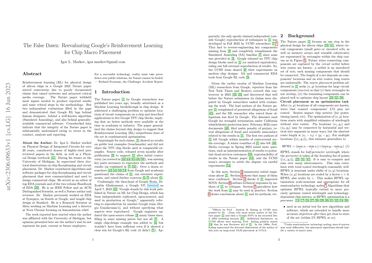The False Dawn: Reevaluating Google's Reinforcement Learning for Chip Macro Placement
Reinforcement learning (RL) for physical design of silicon chips in a Google 2021 Nature paper stirred controversy due to poorly documented claims that raised eyebrows and drew critical media coverage. The paper withheld critical methodology steps and most inputs needed to reproduce results. Our meta-analysis shows how two separate evaluations filled in the gaps and demonstrated that Google RL lags behind (i) human designers, (ii) a well-known algorithm (Simulated Annealing), and (iii) generally-available commercial software, while being slower; and in a 2023 open research contest, RL methods weren't in top 5. Crosschecked data indicate that the integrity of the Nature paper is substantially undermined owing to errors in conduct, analysis and reporting. Before publishing, Google rebuffed internal allegations of fraud, which still stand. We note policy implications and conclusions for chip design.
PDF Abstract
